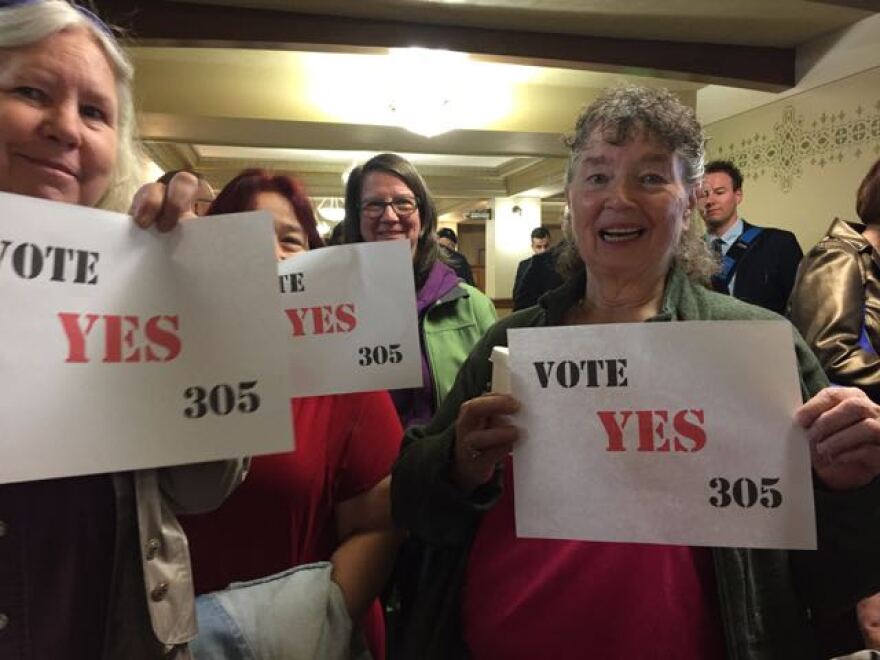A bill intended to save counties hundreds of thousands of dollars in the upcoming special election for Montana's vacant U.S. House seat brought heated testimony and debate Thursday in the Capitol.
Senate Bill 305 would allow counties the option of running the May 25 election entirely through mail-in-ballots. Great Falls Republican Senator Steve Fitzpatrick introduced his bill to the House Judiciary Committee:
"This election is going to be very expensive, it’s going to be an incredible burden on your local taxpayer. The cost of running a statewide election is somewhere between two and three million dollars. And that cost is primarily borne by the local your local county governments."
Fitzpatrick and county election offices estimate the cost savings for running the special election without physical polling places could be over $500,000 statewide.
But opponents of the bill say it will jeopardize the integrity of the election and hurt voting access for rural and Native American communities.
Susan Good Geise, a Lewis and Clark County Commissioner, testified in support of the bill. She served as the chair of the Montana GOP in the early 1990s:
"The kerfuffle surrounding this bill seems to be the fear of the Republican leadership about a big turnout that would somehow favor Democrats if Senate Bill 305 passes and this extraordinary election is run as a mail ballot. I respectfully submit that that notion is just flat untrue."
The political maneuvering behind SB-305 was brought up throughout the hearing.
In February, the chairman of the Montana GOP sent out an email asking Republicans to oppose the bill. The chairman said mail ballots give Democrats an inherent advantage in close elections.
Austin Knudsen, the Republican speaker of the house received criticism for placing SB-305 in the House Judiciary Committee instead of a committee that usually deals with legislation regarding elections. SB-305's Republican sponsor says this was done in order to kill the bill, but the speaker says it was out of concern of the legislation being unconstitutional.
Senate Bill 305's first hearing in the House Thursday lasted over 2 hours, broken by up by disruptions, challenges to the Republican committee chair's authority, and the sergeant-at-arms clearing the room and escorting a woman out of the committee hearing.
Carole Mackin, who identified herself as a taxpayer from Helena, was removed from the room after disobeying committee chairman Alan Doane's order to keep testimony short.
Democratic lawmakers argued with the committee's chair for not allowing more time for the more than two dozen county commissioners and clerks and recorders to testify in support of the bill. Far more people showed up to support the bill than oppose it.
The Republican committee chair says he gave equal time to both sides and needed to keep the hearing on schedule.
Gary McDonald says he drove over 400 miles from where he lives and works as a Roosevelt County Commissioner in order to support the bill. He says the election is too soon to effectively organize physical places for people to vote:
"I’m quite concerned of not being able to get enough judges. Polling places are really an issue right now and we’re a long county, 90 miles long, and if we can't get a polling places up on the other end of the county it could mean a long trip for people to get to the polling places to vote. It's basically convenient for the people and saving us a pile of money. Put politics aside and do what is best for the taxpayers of Montana."
Supporters of the bill say it will increase voter turnout and save counties money for the special election that they haven't budgeted for. But Representative Sharon Stewart-Peregoy, a five-term Democrat from Crow Agency, says running elections by mail will hurt voting access for some Montanans:
"One size does not fit all. There has been voter suppression in the past, all mail balloting, the science behind it does not work for rural Montana, it does not work for American Indians."
George Real Bird III is a county commissioner in Big Horn, where Stewart-Peregoy lives:
"We don’t have mailboxes at our homes like many of you do, maybe in Billings or Missoula. We have to drive to town to go to our post office box. So if we have to drive we might as well go to the poll that day to0. My biggest question was how am I going to get the most people to the polls in my area; and for me that’s the poll."

Republican Secretary of State Corey Stapleton says allowing counties the option of doing an all mail ballot election would remove judges, and eyes that watch the voting process.
"We are not here to run the cheapest elections. We are here to run the best elections. As elected officials it is not our task to make our job easier. As Montana’s chief election officer who just took office, who is trying to delicately run an election 63 days away, I would ask you not to just table this foolish and short-sighted idea, but to do it and table this now so we can get out and work with the people."
The House Judiciary committee did not vote on the bill Thursday.
Several county elections officials urged the committee to pass the bill soon because mail ballots must be sent out by April 10.
Montana Governor Steve Bullock supports the mail ballot bill. A representative from the governor’s office testified during the hearing that there will be satellite voting offices on Native American reservations open during the special election to address access issues.
The Montana Senate passed the mail ballot bill 37-13 in mid-February



